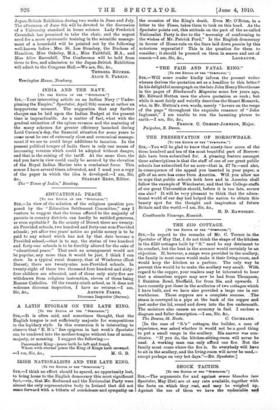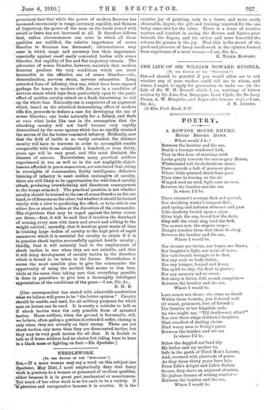SHOCK TACTICS.
[To TEE EDITOR or rim "SpsoiaToz."] SIR,—The arguments for and against orates blanches (see Spectator, May 21st) are at any rate available, together with the facts on which they rest, and may be weighed up, Against the use of them we have the undeniable and
prominent fact that while the power of modern firearms has increased enormously in range, accuracy, rapidity, and flatness of ,trajectory, the power of the man on the horse armed with sword or lance has not increased at all. It therefore follows
• that, unless circumstances can arise in which all these qualities are nullified, the relative importance of armes blanches to firearms has decreased ; circumstances may arise in which range and accuracy lose their importance, especially against small easily concealed bodies with armes blanches, but rapidity of fire and flat trajectory remain. The advocates of armes blanches, however, maintain that modern firearms produce the very conditions which are most favourable to the effective use of armes blanches,—viz., demoralisation, nervous strain, nervous exhaustion. Long extended lines of infantry, they say, which have been exposed , perhaps for hours to modern rifle fire are in a condition of nervous strain which lays them particularly open to the panic effect of sudden cavalry attack on a flank threatening to roll . up the whole line. Naturally one is suspicious of an argument . which, based on the admitted demoralising effect of modern rifle fire, proceeds to deduce a case for developing the use of armes blanches ; one looks naturally for a fallacy, and finds
at once what looks like one in the assumption that the attacking cavalry will not itself become very rapidly demoralised by the same agency which has so rapidly strained the nerves of the far better concealed infantry. Evidently, now that the field of battle is so vastly extended, the distance cavalry will have to traverse in order to accomplish results • comparable with those attainable a hundred, or even thirty, years ago will be very great, and this must diminish the chanties of success. Nevertheless many practical soldiers experienced in war as well as in the not negligible object- lessons afforded in peace manoeuvres, are convinced that, owing • to oversights of commanders, faulty intelligence, defective training of infantry to meet sudden onslaughts of cavalry, there are still likely to be opportunities for well-tithed cavalry ' attack, producing overwhelming and disastrous consequences
to the troops attacked. The practical question is not whether cavalry should be trained to the use of armes blanches on the one hand, or of firearmson the other, but whether it should be trained wholly with a view to producing fire effect, or to be able to use either fire or shock tactics at the discretion of the commander. The objections that may be urged against the latter course are three,—first, it will be said that it involves the drawback of arming every man with lance and sword and adding to the weight carried ; secondly, that it involves great waste of time in training large bodies of cavalry to the high pitch of rapid manoeuvre which it is essential for cavalry to attain if it is to practise shock tactics successfully against hostile cavalry ; thirdly, that it will certainly lead to the employment of shock tactics in war when they are not suitable, and that it will delay development of cavalry tactics in the direction which is bound to be taken in the future. Nevertheless it seems the most sensible plan to give the commander the opportunity of using the method that seems to him best, while at the same time taking care that everything possible is &the in peacetime to give him a thoroughly intelligent appreciation of the conditions of the game.—I am, Sir, &c.,
E. H. B.
[Our correspondent has stated with admirable moderation
what we believe will prove to be " the better opinion." Cavalry should be usable, and used, for all military purposes for which men on horses can be used. It is surely a mistake to talk as if shock tactics were the only possible form of mounted tactics. Horse soldiers, when the ground is favourable, will, we believe, often gallop a position in extended order, closing in only when they are actually on their enemy. These are not shock tactics, any more than they are dismounted tactics, but they may be very good tactics for all that. It is foolish to talk as if horse soldiers had no choice but riding knee to knee in a black mass or fighting on foot.—En. Spectator.]



















































 Previous page
Previous page